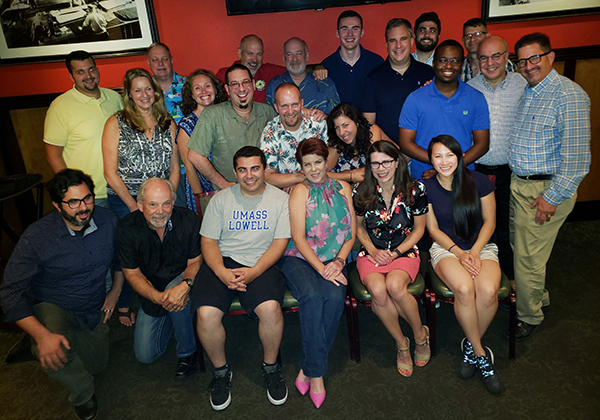News Archive
Written by Johnson Aina, Idaho State University
Edited by Jordan Noey, University of Michigan, HPS Student Support Committee

Steven Snay, center in Hawaiian shirt, surrounded by fellow UMass Lowell alumni and students
Submitted photo
This month, the Student Support Committee chatted with Steven Snay, PhD, CHP, director of radiation safety, University of Massachusetts Lowell (UMass Lowell). He shares with us his background, experiences, motivation, and advice to students, early career professionals, and the Health Physics Society (HPS).
Steven, from a family of tradespeople, started off in a trade school as a carpenter. A visit to the guidance counselor's office changed his life. While there he saw an opportunity to learn nuclear engineering at Three Rivers Community College (TRCC) for free. This started him on a trajectory to where he is today. He went on to the UMass Lowell, where he got the opportunity to learn the health physics content—by immersion. While working at the reactor, he received his BS and was able to secure a health physics tech job at UMass Lowell. He then pursued his MS and, eventually, PhD in radiological sciences.
Steven's motivation to become a health physicist can be traced back to his two years at TRCC and a few summers and outages with Millstone Nuclear Power in Waterford, Connecticut, where he observed a health physicist for the first time. He started looking closely at the profession and after a bit of research, he knew that is what he wanted to be.
Due to his high level of professionalism and excellence as the director of the Radiation Safety Office at UMass Lowell, his office was recognized with the "Outstanding Radiation Safety Program Award" by the HPS Academic, Industrial, and Research Radiation Safety Section in 2022. One of the things that keeps him motivated are his students succeeding and the eagerness to always assist them in navigating projects, theses, and dissertations that will best position them for their own career in health physics. Also having challenges and new things to be done every day keeps him motivated on his job.
Steven's advice to students who are currently in the health physics program:
- Always be willing to learn (not only in classes).
- Intern in a radiation safety office. There, one can learn what operational radiation safety is. This action will make a student more marketable upon entering the profession.
- Examine all the various industry sectors—hospitals, universities, industry, power generation, regulations, and national labs—where health physics is a critical element of the industry.
His advice to early-career professionals:
- Don't stop advancing yourself—consider becoming certified by the American Academy of Health Physics. He opined that it is not the certification that betters one; it is studying for the exam that introduces one to the diversity of the profession and the complexity of radiation safety.
- Keep meeting other professionals by joining the HPS and the HPS's local chapter. These connections help and may even be a lifeline in some cases of need.
In reference to getting more students in health physics programs across the country, he advised that universities should be more engaged in outreach programs and have a clear website that explains what they do and the research they're conducting. Also, he challenged companies to be actively engaged in promoting health physics programs by giving scholarships, building labs, and organizing academic fairs—all activities that will go a long way in motivating students.
Steven said he thinks the HPS is doing a good job by keeping professionals up to speed with new items on the horizon and keeping the members connected. He looks forward to seeing a national HPS meeting in New England. He advises the HPS to have a bigger lobbying arm to help bring people into the profession. This should start with high school sciences and continue through college-level training programs. Steven also believes that HPS should be strongly stating that a health physicist cannot get all the training needed from a 40-hour radiation safety officer course. He encourages HPS, as well as all health physicists, to fight for recognition of the breadth and depth of knowledge one must have to truly be a health physicist.




